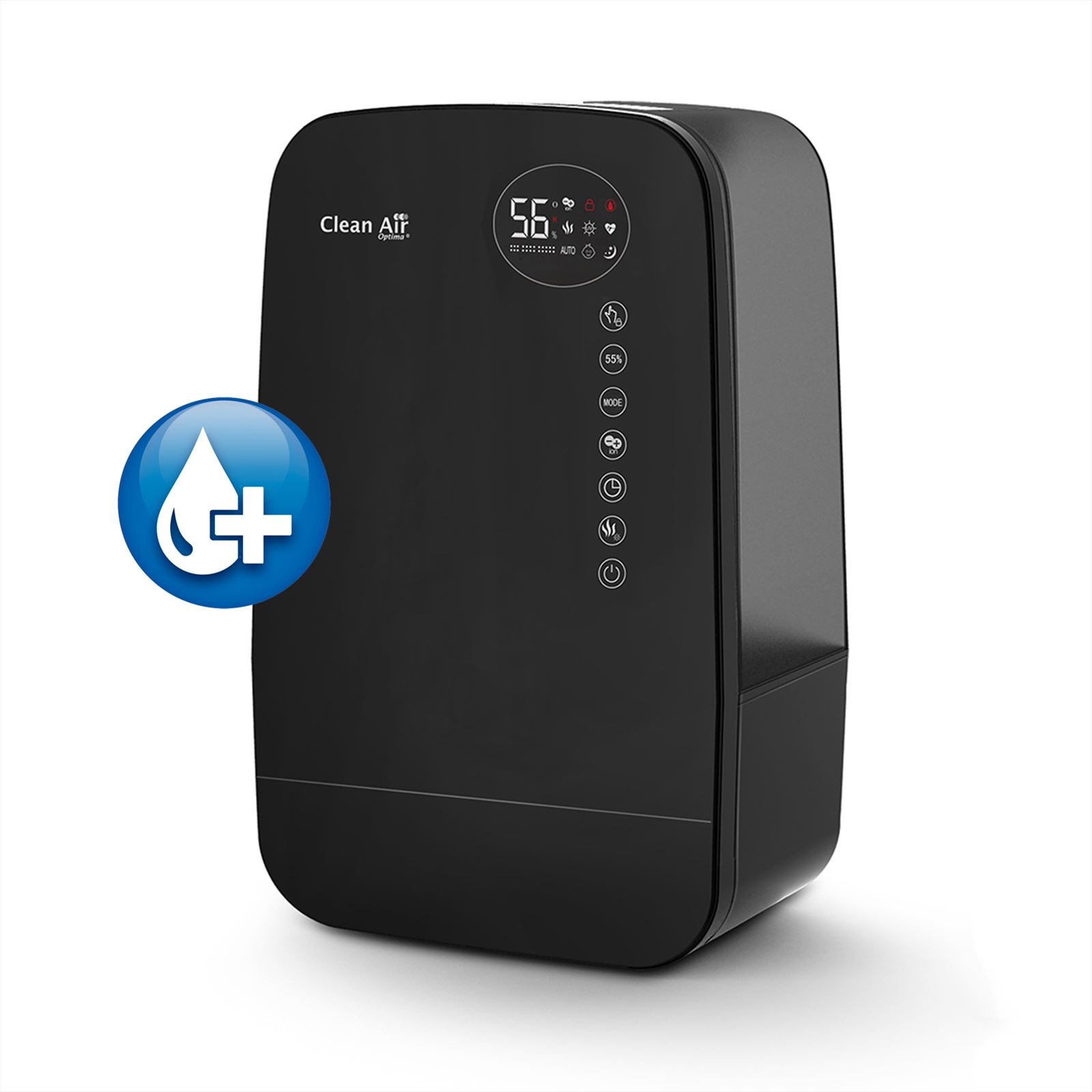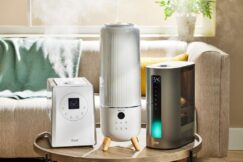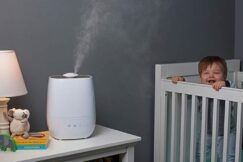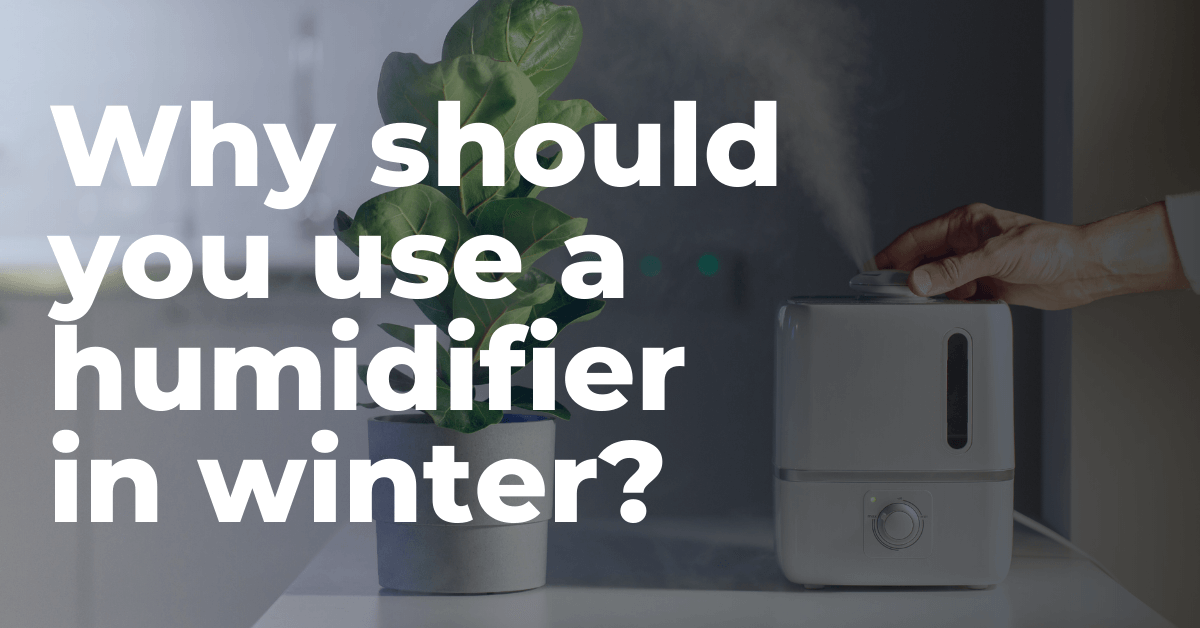Humidifiers provide numerous benefits for health and well-being. Properly moisturized indoor air helps alleviate dry skin, control allergies, and relieve respiratory symptoms.
Humidifiers play a vital role in maintaining a healthy and comfortable indoor environment. By adding moisture to the air, these devices offer a range of advantages that positively impact our overall well-being. The benefits of using a humidifier are significant from alleviating dry and itchy skin to relieving respiratory symptoms and controlling allergies.
We will explore these benefits in more detail, helping you understand why investing in a humidifier can greatly enhance your quality of life. So, let’s delve into the advantages of using a humidifier and how it can positively impact your health and comfort levels at home or in the workplace.

Credit: www.cleanairoptima.com
Understanding The Role Of Humidifiers In Enhancing Health And Comfort
Humidifiers play a crucial role in improving health and enhancing comfort by maintaining optimal moisture levels in the air. They help alleviate dryness and congestion, reducing the risk of allergies, asthma, and dry skin, while also promoting better sleep and overall well-being.
Introduction To The Significance Of Maintaining Proper Humidity Levels
Understanding the role of humidifiers in enhancing health and comfort is crucial when it comes to maintaining optimal indoor environments. One important factor in creating a comfortable living space is humidity. Maintaining proper humidity levels not only contributes to our overall wellbeing but is also vital for our respiratory health, skin hydration, and even the condition of our furniture and home appliances.
How Humidifiers Can Help Regulate Humidity In Indoor Spaces
Humidifiers play a key role in regulating humidity levels in indoor spaces. By using these devices, you can ensure that the air in your home or workplace remains at an ideal moisture level, thereby improving your overall comfort and health. Let’s delve into some of the ways humidifiers can help maintain optimum humidity:
- Relieve dry skin and prevent dryness-related discomfort: Harsh winter months often bring along dry air, which can result in itchy, flaky, and uncomfortable skin. Humidifiers release a cool or warm mist into the air, replenishing moisture and relieving dryness, giving your skin the hydration it needs.
- Alleviate respiratory congestion: Low humidity levels can cause irritation and dryness in the nasal passages, leading to congestion and difficulty in breathing. Humidifiers add moisture to the air, making it easier for you to breathe, reducing the risk of respiratory problems and enhancing overall respiratory health.
- Prevent allergies and asthma triggers: Dry air can worsen allergies and asthma symptoms, such as coughing, sneezing, and wheezing. By incorporating a humidifier in your space, you can increase the humidity levels and decrease the presence of allergens and triggers in the air, helping you to breathe more easily and reducing the frequency and severity of allergy and asthma attacks.
- Protect wooden furniture and musical instruments: Lack of moisture in the air can cause wood to shrink, crack, or become warped. Humidifiers help to maintain stable humidity levels in your home, preventing these damages and extending the lifespan of your prized wooden furniture and musical instruments.
Improving Respiratory Health And Preventing Irritations
Humidifiers provide a range of benefits, including improved respiratory health and prevention of irritations. These devices help to add moisture to the air, reducing dryness and relieving symptoms such as congestion and sore throat. By maintaining optimal humidity levels, humidifiers promote a healthier indoor environment for all.
The Connection Between Low Humidity And Respiratory Issues
Low humidity levels can have a significant impact on our respiratory health, often leading to a range of uncomfortable symptoms and irritations. The air we breathe becomes drier as the humidity drops, which can cause our respiratory system to become dry and irritated as well. When the air around us lacks moisture, it can hinder the natural defense mechanisms of our respiratory tract, making it easier for allergens, pollutants, and viruses to infiltrate our body.
How Humidifiers Can Alleviate Symptoms Of Dry Throat And Cough
Humidifiers play a pivotal role in creating a healthier indoor environment by adding moisture to the air, counteracting the adverse effects of low humidity. By increasing the humidity level, these devices effectively alleviate symptoms of dry throat and cough, providing relief and comfort. When the air we breathe is humidified, it helps to soothe the respiratory tract, preventing dryness and reducing irritation. As a result, the frequency and severity of dry throat and persistent coughs can be significantly reduced.
Preventing Allergies And Sinus Congestion With Optimal Humidity
Optimal humidity is crucial in preventing allergies and sinus congestion. When the air is too dry, it can cause the nasal passages to dry out, increasing the risk of nasal congestion and irritation. By maintaining the right level of humidity, humidifiers help to keep our nasal passages moist, reducing the chances of sinus blockages and congestion. In addition, optimal humidity hinders the growth of mold and dust mites, common triggers for allergies. By keeping these allergens at bay, humidifiers contribute to preventing allergic reactions and improving overall respiratory health.
Promoting Skin Health And Hydration
When it comes to our skincare routine, we often focus on external products like moisturizers and serums. However, one of the most important factors that can significantly impact the health and appearance of our skin is the humidity level in our environment. Low humidity can lead to dryness, irritation, and even exacerbate certain skin conditions. To combat these issues and achieve a healthy, glowing complexion, incorporating a humidifier into your daily routine can make all the difference. Let’s explore the benefits of humidifiers in promoting skin health and hydration.
The Impact Of Low Humidity On Skin Dryness And Irritation
In low humidity environments, the moisture in our skin evaporates more quickly, resulting in dryness, discomfort, and even itching. This is especially true during the winter months when the air tends to be drier. Dry air can strip our skin of its natural oils, leaving it feeling parched and looking dull. Additionally, low humidity can exacerbate skin conditions such as eczema and psoriasis, leading to increased redness, flakiness, and itching.
How Humidifiers Can Moisturize The Skin And Prevent Dryness
Humidifiers work by adding moisture to the air, increasing the humidity level in our surroundings. By releasing a fine mist of water vapor, these devices help to replenish the moisture that our skin loses throughout the day. This added moisture helps to hydrate and nourish the skin, preventing dryness and promoting a healthy and youthful appearance.
The moisturizing effect of humidifiers is particularly beneficial for individuals with dry or sensitive skin. By creating a more humid environment, these devices can help to combat the drying effects of indoor heating systems, air conditioning, and harsh weather conditions.
Addressing Common Skin Conditions With Proper Humidity
Proper humidity levels can play a crucial role in managing and addressing common skin conditions. For example, individuals with eczema often experience flare-ups due to dryness and irritation. By maintaining a suitable humidity level with the help of a humidifier, the skin’s moisture barrier can be strengthened, reducing the frequency and severity of eczema symptoms.
Similarly, individuals with acne-prone skin can benefit from a balanced humidity level. Too low humidity can lead to excess oil production as the skin tries to compensate for the lack of moisture. On the other hand, too high humidity can create a breeding ground for bacteria, potentially worsening acne symptoms. Finding the right balance with the help of a humidifier can help regulate oil production without promoting bacterial growth.
In conclusion, incorporating a humidifier into your daily skincare routine can provide numerous benefits for promoting skin health and hydration. By maintaining a suitable humidity level, you can prevent dryness, irritation, and address common skin conditions. Invest in a quality humidifier today and let your skin experience the transformative effects of proper hydration.
Improved Sleep Quality
Sleep better with the help of a humidifier. Experience improved sleep quality through balanced humidity levels in the air.
The Relationship Between Humidity And Sleep
Did you know that the level of humidity in your bedroom can have a significant impact on the quality of your sleep? It may not be something you think about often, but the humidity in the air can affect your ability to fall asleep, stay asleep, and even the overall comfort of your sleep environment. When the air is too dry or too humid, it can lead to a host of sleep disturbances and discomfort throughout the night.
How Using A Humidifier Can Promote A Better Night’s Sleep
A humidifier is an easy and effective solution to combat the negative effects of improper humidity levels on your sleep. By adding moisture to the air, it can help create a more comfortable sleep environment and promote a better night’s rest. Let’s take a closer look at how using a humidifier can improve your sleep quality:
- Preventing Dryness: Dry air can irritate your nasal passages, throat, and skin, making it harder to breathe and sleep peacefully. A humidifier adds moisture to the air, helping to prevent dryness and reducing discomfort.
- Relieving Congestion: If you frequently wake up feeling congested or with a stuffy nose, it could be due to low humidity levels in your bedroom. A humidifier can help relieve nasal congestion, allowing you to breathe easily and enjoy uninterrupted sleep.
- Reducing Snoring: Snoring is often exacerbated by dry air, as it can irritate the throat and nasal passages. By maintaining optimal humidity levels, a humidifier helps reduce snoring, allowing both you and your partner to enjoy a peaceful night’s sleep.
- Addressing Sleep Apnea: Sleep apnea is a serious condition where breathing repeatedly stops and starts during sleep. Dry air can worsen the symptoms of sleep apnea, making it harder to breathe. Using a humidifier can help alleviate these symptoms and provide relief.
Addressing Snoring And Sleep Apnea With Controlled Humidity
A humidifier plays a crucial role in addressing snoring and sleep apnea by maintaining controlled humidity levels in your sleep environment. Snoring is often caused by the vibration of tissues in the mouth and throat, which can be aggravated by dry air. Similarly, sleep apnea can be worsened by low humidity levels, leading to more frequent breathing interruptions during the night. By adding moisture to the air, a humidifier can minimize these problems, ensuring better breathing and reducing the frequency and intensity of snoring and sleep apnea episodes.
Enhanced Comfort In Extreme Temperatures
When it comes to creating a comfortable environment, the role of humidity cannot be underestimated. Whether you are battling the bone-chilling cold of winter or enduring the sweltering heat of summer, maintaining the right humidity levels can make all the difference. In this section, we will explore how using humidifiers can help combat dryness in the winter months and provide relief from excessive heat. Let’s dive in and discover the benefits of humidity control for enhanced comfort in extreme temperatures.
The Role Of Humidity In Creating A Comfortable Environment
Humidity plays a crucial role in determining the comfort level of any indoor space. When humidity levels are too low, such as in dry winter months, it can lead to a myriad of discomforts. Dry skin, sore throat, itchy eyes, and even respiratory issues are common complaints during this time. On the other hand, excessively high humidity can make hot summer days unbearable, causing a feeling of stickiness, difficulty in breathing, and a breeding ground for mold and mildew.
By maintaining optimal humidity levels, you can achieve a balance that enhances your overall comfort. Humidity makes the air feel warmer in cold temperatures, reducing the need for cranking up the thermostat and saving energy. Additionally, proper humidity levels help moisturize the skin, prevent static electricity, and keep nasal passages lubricated, reducing the likelihood of illnesses caused by dry air.
Using Humidifiers To Combat Dryness In Cold Winter Months
In the bitter cold winter months, when the air is dry and the heating systems run continuously, a humidifier becomes your trusted ally. This simple yet powerful device adds moisture to the air, combating the dryness that can wreak havoc on your skin, sinuses, and overall well-being. When used in conjunction with a heating system, a humidifier can create a cozy atmosphere that allows you to stay comfortable without sacrificing warmth.
Humidifiers come in different types, such as evaporative, ultrasonic, or steam humidifiers. Each type has its benefits and considerations, but all of them serve the common purpose of increasing humidity levels. By distributing invisible moisture evenly throughout your home, humidifiers not only alleviate dry skin and respiratory problems but also reduce static electricity, soothe dry eyes, and even preserve wooden furniture and other materials prone to cracking in dry conditions.
Finding Relief From Excessive Heat With The Right Humidity Levels
Just as dry air can be uncomfortable during the winter, excessive heat and high humidity can make summer days feel unbearable. Luckily, with the right humidity levels, you can find some much-needed relief. By using a dehumidifier or an air conditioner with a built-in dehumidifying function, you can control the humidity in your space and create a cool and comfortable environment.
Excessive humidity not only makes you feel hot and sticky, but it can also hinder the body’s natural cooling mechanisms, making it harder to regulate body temperature. By reducing humidity levels, you can feel cooler at higher temperatures, which can lead to energy savings by allowing you to use the air conditioner more efficiently.
To ensure the right humidity levels, it is recommended to keep the indoor relative humidity between 30% and 50% for optimal comfort. This range provides a sweet spot where you can enjoy the benefits of moisture in the air without feeling too clammy or dry.
In conclusion, by understanding the role of humidity in creating a comfortable environment and using humidifiers or dehumidifiers accordingly, you can experience enhanced comfort in extreme temperatures. Whether battling dryness in the winter or finding relief from excessive heat, proper humidity control can make your indoor space a haven of comfort.
Protecting Furniture, Wooden Flooring, And Electronics
When it comes to maintaining the quality and longevity of your furniture, wooden flooring, and electronics, humidity levels play a crucial role. Excessive moisture or dry air can cause significant damage to these valuable assets, leading to costly repairs or replacements. In this section, we will explore the impact of low humidity on wooden materials and electronics, and how incorporating a humidifier into your home can prevent such damage, ultimately preserving the aesthetics and prolonging the lifespan of your furniture and electronic devices.
The Impact Of Low Humidity On Wooden Materials And Electronics
Low humidity levels can have adverse effects on both wooden materials and electronic devices. When the air lacks moisture, wooden furniture and flooring can become susceptible to cracking, warping, and shrinking. Dry air causes the loss of moisture from the wood, leading to the breakdown of its chemical structure. This can result in unsightly cracks, distortions in shape, and even permanent damage.
Similarly, electronics are not immune to the effects of dry air. Low humidity levels can increase static electricity, which can cause electrical components in devices to malfunction or even short circuits. This can lead to a complete failure of electronics, rendering them useless and requiring costly repairs or replacements.
How Humidifiers Can Prevent Damage And Maintain Their Longevity
To prevent damage to wooden materials and electronics, it is essential to maintain an optimal humidity level in your indoor environment. Humidifiers play a crucial role in achieving this balance by adding moisture to the air.
By releasing a fine mist of water vapor into the atmosphere, humidifiers restore moisture content in the air and help prevent the negative effects of low humidity on wooden materials. The added moisture allows the wood to maintain its natural moisture balance, reducing the risk of cracks, warping, or shrinking.
Moreover, humidifiers create an environment with sufficient humidity for electronics to function properly. By minimizing static electricity, they help prevent malfunctions and keep your electronic devices in optimal working condition. With the use of a humidifier, you can extend the lifespan of your electronics and avoid the hassle and expense of frequent repairs or replacements.
Preserving The Quality And Aesthetics Of Furniture
Wooden furniture adds warmth, elegance, and beauty to any living space. However, without proper care, it can lose its charm and deteriorate prematurely. By maintaining a suitable humidity level with the help of a humidifier, you can preserve the quality and aesthetics of your furniture.
When the air is too dry, wooden furniture can become brittle and prone to damage. Cracks and splits can develop, causing the furniture to lose its structural integrity and aesthetic appeal. However, by introducing a humidifier into your home, you can prevent these issues. The optimal humidity level provided by a humidifier keeps the wood moisturized, preventing it from drying out and maintaining its natural beauty for years to come.
Reducing The Risk Of Illness Transmission
When it comes to maintaining a healthy home environment, reducing the risk of illness transmission should be a top priority. Airborne viruses and bacteria can easily spread through the air, leading to respiratory infections and other health issues. However, with the help of humidifiers, you can effectively minimize the transmission of illnesses and create a healthier living space for everyone in the household.
How Humidity Affects Airborne Viruses And Bacteria
Humidity plays a crucial role in determining the survival and transmission of airborne viruses and bacteria. Research has shown that low humidity levels can significantly increase the lifespan of these microorganisms, making them more likely to linger in the air and remain infectious. On the other hand, maintaining an optimal humidity level can help reduce the viability of these pathogens, making them less likely to cause infections.
When the air is too dry, viruses and bacteria can stay suspended in the air for longer periods, increasing the risk of inhalation and subsequent transmission. However, when the humidity level is within the recommended range, typically between 40-60%, the air becomes less favorable for these microorganisms to survive. This makes it harder for viruses and bacteria to stay suspended in the air, reducing the chances of transmission.
Using Humidifiers To Minimize The Spread Of Respiratory Infections
Humidifiers are valuable tools for controlling indoor humidity levels and minimizing the spread of respiratory infections. By adding moisture to the air, humidifiers can optimize the humidity level within your home and create an environment that is less favorable for airborne viruses and bacteria.
When using a humidifier, it is important to regularly monitor and adjust the humidity level to ensure it stays within the recommended range. Too much humidity can promote the growth of mold and other harmful microorganisms, while insufficient humidity may not provide the desired benefits. Finding the right balance is crucial to effectively minimize the spread of respiratory infections.
Along with maintaining optimum humidity levels, practicing good hygiene habits such as regular handwashing and proper ventilation are also important in reducing the risk of illness transmission. When combined with the use of humidifiers, these measures can create a comprehensive approach to safeguarding the health of everyone in your household.
Creating A Healthier Environment For Everyone In The Household
By using humidifiers to regulate indoor humidity levels, you can create a healthier environment for everyone in your household. This is especially beneficial for individuals with respiratory conditions such as asthma or allergies, as well as young children and the elderly who may be more susceptible to respiratory infections.
The adequate moisture provided by humidifiers can help alleviate dryness in the nasal passages and throat, reducing discomfort and making it easier to breathe. It can also help soothe symptoms such as coughing and congestion, promoting more restful sleep and overall well-being.
Moreover, humidifiers can help to reduce the risk of respiratory infections not only by optimizing humidity levels but also by minimizing the survival of airborne viruses and bacteria. By creating an environment that is less hospitable to these pathogens, humidifiers play a valuable role in protecting the health of your loved ones.
Understanding Different Types Of Humidifiers
A good-quality humidifier can be a game-changer for your home or office, providing numerous benefits such as relieving dry skin, soothing allergies, reducing static electricity, and improving overall air quality. However, with so many different types of humidifiers available in the market, it can be overwhelming to choose the right one that suits your needs best. In this blog post, we will provide an overview of the various types of humidifiers, along with their pros and cons, to help you make an informed decision.
An Overview Of The Various Types Of Humidifiers Available
Humidifiers come in various shapes, sizes, and technologies, each with its unique features and benefits. To help you understand the differences, let’s take a closer look at the different types of humidifiers:
Pros And Cons Of Each Type To Consider When Purchasing
Before making a purchase, it is important to weigh the pros and cons of each type of humidifier to ensure you choose the one that meets your specific needs. Below, we have listed the advantages and disadvantages of each type:
Cool Mist Humidifier:
| Pros | Cons |
|---|---|
| ✓ Provides relief from dry skin, allergies, and respiratory issues | ✗ Can promote the growth of mold and bacteria if not properly maintained |
| ✓ Energy-efficient and safe for use around children and pets | ✗ Requires frequent water tank refills |
| ✓ Can be used with essential oils for aromatherapy benefits |
Warm Mist Humidifier:
| Pros | Cons |
|---|---|
| ✓ Provides soothing comfort for cold and flu symptoms | ✗ Can cause burns or accidents due to hot water or steam |
| ✓ Helps to alleviate congestion and sinus problems | ✗ Consumes more energy than cool mist humidifiers |
| ✓ Virtually silent operation |
Ultrasonic Humidifier:
| Pros | Cons |
|---|---|
| ✓ Produces a fine mist using sound vibrations | ✗ Requires regular maintenance to prevent bacterial growth |
| ✓ Energy-efficient and quiet operation | ✗ Can leave mineral deposits in the surrounding area |
| ✓ Suitable for large rooms due to higher moisture output |
Matching The Humidifier To Specific Needs And Room Size
When choosing a humidifier, it’s important to consider your specific needs and the size of the room you want to humidify. Different types of humidifiers have different moisture output levels, so selecting the right one ensures optimal performance. Here are a few tips to help you match the humidifier to your specific requirements:
- Measure the square footage of the room to determine the appropriate humidifier capacity.
- If you have a small room or office, a compact humidifier may be sufficient.
- For larger spaces, consider a humidifier with a higher moisture output or opt for multiple units.
- Take into account the noise level, energy efficiency, and maintenance requirements when making your decision.
Now that you have a better understanding of the different types of humidifiers, their pros and cons, and how to match them to your needs and room size, you can confidently choose the right humidifier that will bring comfort and improve your indoor environment.
Maintenance And Safety Tips For Humidifier Usage
Discover maintenance and safety tips for effective humidifier usage to reap the maximum benefits. From regular cleaning to proper water management, these tips ensure a healthy and comfortable environment, improving respiratory health and reducing the risk of infections.
Important Guidelines For Proper Humidifier Maintenance
Maintaining your humidifier properly is essential to ensure its optimal performance and prevent potential issues. These guidelines will help you in keeping your humidifier in top shape:
- Read the manufacturer’s instructions: Before using your humidifier, carefully read the instruction manual provided by the manufacturer. Familiarize yourself with the specific maintenance requirements and guidelines suggested for your humidifier model.
- Regular cleaning schedule: To avoid the buildup of mineral deposits and the growth of bacteria, it’s crucial to clean your humidifier regularly. Empty and clean the water tank, base, and other removable parts at least once a week, or as recommended by the manufacturer.
- Use distilled or demineralized water: To minimize mineral buildup in your humidifier, it is advisable to use distilled or demineralized water. Tap water contains minerals that can accumulate as white dust in the humidifier and also promote bacterial growth.
Tips For Cleaning And Avoiding Bacterial Growth
To ensure the cleanliness of your humidifier and prevent the growth of bacteria, follow these tips:
- Empty and refill daily: After each use, empty the water tank, rinse it thoroughly, and refill it with fresh water. This prevents the growth of bacteria and keeps the humidifier free from any potential contaminants.
- Deep cleaning with vinegar: Periodically, perform a deep cleaning by soaking the removable parts, excluding the motor, in a vinegar and water solution. This helps to remove mineral deposits and kill any bacteria. Rinse the parts thoroughly afterward.
- Replace filters regularly: If your humidifier has a filter, follow the manufacturer’s recommendations for filter replacement. Over time, filters can become clogged or develop bacteria, reducing their efficiency and potentially releasing contaminants into the air.
Ensuring Safe Operation And Prevention Of Accidents
When using a humidifier, it’s important to ensure safe operation and take necessary precautions to prevent accidents. Here are a few guidelines to consider:
- Place the humidifier on a stable surface: Position your humidifier on a flat and stable surface to prevent accidental tipping or spilling of water.
- Keep out of reach of children and pets: Place your humidifier in a location where it is inaccessible to children or pets, especially when it is operating.
- Monitor humidity levels: Regularly check the humidity levels in the room to prevent over-humidification. High humidity levels can lead to discomfort, condensation, and the potential growth of mold.
- Follow electrical safety measures: Ensure that the electrical cord of your humidifier is in good condition, and avoid using extension cords whenever possible. Keep the cord away from water to minimize the risk of electrical shock or damage.
By adhering to these maintenance and safety tips, you can maximize the effectiveness of your humidifier while ensuring the well-being of your environment.
Frequently Asked Questions About Humidifier Benefits
How Does A Humidifier Benefit Your Health?
A humidifier adds moisture to the air, which can help relieve dryness and alleviate symptoms of dry skin, dry throat, and dry eyes. It can also reduce nasal congestion, soothe irritated sinuses, and ease coughing and snoring caused by dry air.
By maintaining optimal humidity levels, a humidifier promotes overall respiratory health.
Can A Humidifier Improve Indoor Air Quality?
Yes, a humidifier can improve indoor air quality by adding moisture to the air, which helps to reduce airborne pollutants and allergens. Dry air can contribute to the spread of viruses and bacteria, while properly humidified air can help to prevent them from lingering.
A humidifier can also reduce static electricity and prevent furniture, wood floors, and musical instruments from drying out.
Can A Humidifier Help With Dry Skin And Allergies?
Absolutely! A humidifier adds moisture to the air, helping to soothe dry skin and prevent it from becoming dry and itchy. It can also provide relief for those suffering from allergies by reducing airborne allergens and minimizing nasal congestion. However, it’s important to regularly clean and maintain the humidifier to prevent the growth of mold or bacteria.
Conclusion
Using a humidifier in your home or office can have a multitude of benefits for both your health and the environment. It helps to maintain optimal humidity levels, preventing dryness and improving respiratory conditions. Additionally, it can alleviate allergies, reduce the spread of airborne viruses, and even improve your sleep quality.
By investing in a humidifier, you are taking a proactive step towards creating a healthier and more comfortable living space.




